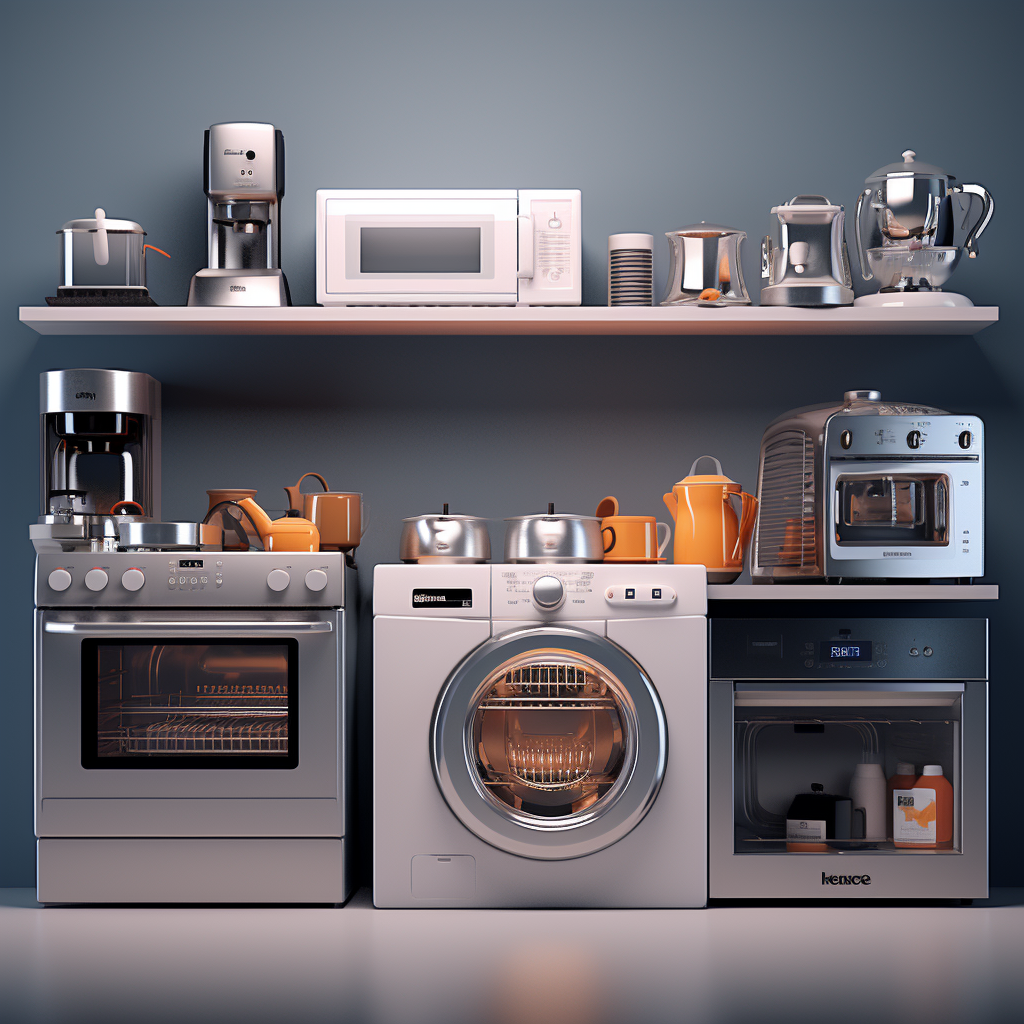
Get ready to stay ahead of the game with the latest insights into the appliance industry trends for 2024. From cutting-edge technology to eco-friendly innovations, this article will provide you with valuable information on what to expect in the coming year. Discover how the industry is evolving and how these trends will impact your everyday life. It’s time to embrace the future and make informed decisions when it comes to your household appliances. So, buckle up and get ready for an exciting journey into the future of the appliance industry!
Market growth
The appliance industry is experiencing significant growth in 2024 due to several key factors. One major driver is the increased demand for smart appliances. As people become more tech-savvy and rely on technology for everyday tasks, the demand for appliances with smart features is on the rise. Smart appliances offer convenience, efficiency, and connectivity, allowing users to control and monitor their appliances remotely through smartphone apps. From smart refrigerators that can create shopping lists to washing machines that can be operated from anywhere, these appliances have become increasingly popular among consumers.
Another factor contributing to the market growth is the growing adoption of energy-efficient appliances. With increasing concerns about environmental sustainability and rising energy costs, consumers are actively seeking out appliances that are designed to consume less energy. Energy-efficient appliances not only help reduce utility bills but also have a positive impact on the environment. Manufacturers are responding to this demand by investing in research and development to create appliances that meet strict energy efficiency standards.
The rise in disposable income is also driving appliance purchases. As economies grow and people’s purchasing power increases, they are more inclined to invest in durable goods like appliances. Consumers are looking for appliances that offer better functionality, performance, and longevity. They are willing to spend more on high-quality appliances that can provide a superior user experience. This trend is especially prominent in developing countries where rising incomes are fueling a surge in appliance ownership.
Technological advancements
Technological advancements are revolutionizing the appliance industry in 2024. One significant advancement is the integration of artificial intelligence (AI) in appliances. AI-powered appliances can learn user preferences, adapt to their needs, and provide personalized experiences. For example, a smart oven with AI capabilities can cook food based on individual preferences and even suggest recipes based on available ingredients. AI not only enhances the efficiency and performance of appliances but also offers convenience and ease of use.
The Internet of Things (IoT) connectivity is another technological advancement that is transforming the appliance industry. IoT allows appliances to connect to the internet and interact with other devices and applications. This connectivity enables seamless control and automation of appliances. For instance, users can remotely control their appliances through smartphone apps or even give voice commands to operate them. IoT connectivity also enables appliances to receive software updates, making them more versatile and adaptable to changing needs.
Voice recognition technology is enhancing the user experience of appliances. Appliances equipped with voice recognition technology can understand and respond to voice commands. Users can control and operate their appliances without physically interacting with them, making their daily tasks more convenient. Voice recognition technology is particularly popular in the kitchen, where users can ask their smart appliances to perform tasks like preheating the oven or brewing a cup of coffee, making cooking and meal preparation more effortless.
Evolution of smart home appliances
The evolution of smart home appliances is a notable trend in 2024. The concept of a connected home ecosystem is expanding, with more appliances becoming part of a comprehensive smart home system. These ecosystems allow different appliances, devices, and systems within the home to communicate and interact with each other, creating a seamless and integrated user experience. For instance, a smart home ecosystem can enable appliances like the refrigerator, oven, and dishwasher to coordinate and optimize their functions for a more efficient and streamlined home management.
Smart appliances are also becoming increasingly personalized. Users can set individual preferences and customize their appliances to suit their specific needs. For example, a smart thermostat can learn a user’s temperature preferences and automatically adjust the settings accordingly. Personalized appliances not only offer convenience and comfort but also contribute to energy savings by adapting to individual usage patterns and optimizing energy consumption.
With the increasing adoption of smart appliances and IoT connectivity, there is a growing focus on cybersecurity and data privacy. As appliances collect and transmit personal data, ensuring the security and privacy of this information is crucial. Manufacturers are investing in robust security measures to protect user data from cyber threats. Additionally, they are actively addressing consumer concerns by implementing transparent data policies and providing clear information on how user data is collected, used, and stored.
Sustainable and eco-friendly designs
The appliance industry is embracing sustainability and eco-friendly practices in 2024. Manufacturers are developing appliances that are not only efficient but also environmentally friendly throughout their lifecycle. They are using eco-friendly materials and manufacturing processes that minimize the environmental impact. For example, appliances made from recycled or renewable materials reduce the demand for new resources and help in reducing waste.
Energy-saving features and certifications are also prevalent in modern appliances. Energy-efficient appliances consume less power, resulting in reduced energy consumption and lower utility bills. Many appliances now carry energy efficiency ratings and certifications to inform consumers about their energy-saving capabilities. These certifications help consumers make informed choices and contribute to a more sustainable and energy-conscious lifestyle.
Appliance manufacturers are also taking steps to ensure proper disposal and recycling of their products. End-of-life recycling programs are being implemented to encourage responsible disposal of appliances. These programs aim to recover valuable materials and minimize the environmental impact of appliance disposal. By promoting recycling and responsible waste management, manufacturers are actively contributing to a circular economy and reducing the overall carbon footprint of the industry.
Shift towards online sales
In 2024, the appliance industry is experiencing a significant shift towards online sales. The popularity of e-commerce platforms has skyrocketed, primarily due to the convenience and wider product selection they offer. Online shopping allows consumers to browse and compare appliances from the comfort of their homes, eliminating the need to visit physical stores. The ease of online purchasing has made it a preferred method for appliance shopping, especially for busy consumers who value time and convenience.
Furthermore, online channels provide access to a broader range of products than traditional retail stores. Consumers can explore different brands, models, and features, enabling them to make more informed decisions. Online platforms also offer user reviews and ratings, helping consumers gauge the quality and reliability of the appliances they are interested in. The extensive product selection available online ensures that consumers can find appliances that meet their specific needs and preferences.
The shift towards online sales is also driven by changes in customer buying behavior. Consumers are increasingly comfortable with online shopping and trust the reliability and security of online transactions. The convenience of doorstep delivery and hassle-free returns further enhances the appeal of online shopping. Additionally, online platforms often offer competitive pricing and exclusive deals, making them even more attractive to price-conscious consumers.
Surge in demand for home automation
Home automation is becoming increasingly popular in 2024, leading to a surge in demand for appliances that can be integrated into these systems. Home automation allows users to control and manage multiple devices and systems within their homes through a centralized control unit or smartphone app. This technology offers convenience, efficiency, and enhanced energy savings by automating various tasks and functions.
Appliances that can be seamlessly integrated into home automation systems enable centralized control and management. Users can preset schedules, create routines, and monitor their appliances from a single interface. For example, they can set their smart thermostat to adjust the temperature based on their daily schedule or remotely control their smart lighting to create different moods and ambiance. The integration of appliances into home automation systems offers a more streamlined and interconnected living experience.
Home automation systems also contribute to enhanced energy efficiency and cost savings. Users can optimize energy consumption by automating tasks like adjusting thermostat settings or turning off appliances when they are not in use. Energy monitoring features allow users to track their energy usage and identify areas where they can reduce consumption. Home automation not only provides convenience but also helps in creating a more sustainable and energy-efficient living environment.
Focus on health and wellness
In 2024, there is a growing focus on health and wellness within the appliance industry. Appliances with advanced health monitoring features are gaining popularity among health-conscious consumers. For example, smart scales that can measure body composition and sync the data to smartphone apps allow users to track their fitness goals and progress. These appliances enable users to take control of their health and make informed decisions regarding their well-being.
Air and water purifiers are also in high demand as consumers prioritize the quality of indoor environments. These appliances remove pollutants, allergens, and contaminants from the air and water, ensuring a healthier living space. Smart purifiers can monitor air quality in real-time and adjust their settings accordingly, providing optimal purification based on the surrounding conditions. With increased awareness about the importance of clean air and water, these appliances have become essential for maintaining a healthy lifestyle.
Smart kitchen appliances are promoting healthier eating habits. From smart blenders that provide nutritional information to smart ovens that offer healthier cooking options, these appliances are designed to support a nutritious diet. They can recommend recipes based on dietary preferences, track calorie intake, and even offer portion control suggestions. By combining technology with health-conscious features, smart kitchen appliances are empowering users to make informed choices and lead healthier lives.
Customization and personalization
Appliances that offer customization and personalization features are gaining traction in 2024. Consumers are looking for appliances that complement their personal style and match their home decor. As a result, manufacturers are offering appliances with customizable designs and finishes. Users can select from a range of color options, materials, and finishes to create a cohesive and personalized look in their homes. Customizable appliances allow users to express their individuality and create a unique living space.
Smart appliances are also becoming more intelligent and adaptable to individual user preferences. These appliances can learn and remember user habits, preferences, and usage patterns. For instance, a smart coffee machine can remember the preferred strength and brew size of individual users, eliminating the need to manually adjust settings every time. By learning from user interactions, smart appliances can provide a tailored experience that aligns with individual preferences, simplifying everyday tasks and enhancing user satisfaction.
Integration of personal assistant technology is another trend in customized and personalized appliances. Personal assistant technologies like Amazon Alexa or Google Assistant can be integrated into appliances, providing voice control and access to a wide range of additional functionalities. Users can operate their appliances through voice commands, ask for recipe suggestions, or even request weather updates. The integration of personal assistants adds another layer of customization and convenience, making appliances even more user-friendly and personalized.
Rise of subscription models
The appliance industry is witnessing the rise of subscription models in 2024. Appliance subscriptions offer flexibility and convenience to consumers. Instead of purchasing appliances outright, users can opt for subscription packages that provide access to the latest models and upgrades. This model allows users to have appliances with cutting-edge features without the need for significant upfront costs.
Appliance subscriptions also offer hassle-free maintenance and servicing. Users can benefit from regular maintenance and repair services included in the subscription, eliminating the need to find and arrange for individual servicing. This convenience reduces downtime and ensures that appliances are always in optimal working condition. Additionally, subscriptions can include warranty coverage, providing users with peace of mind and protection against unexpected repair costs.
Reduced upfront costs are a significant advantage of appliance subscriptions. By spreading the cost of appliances over the subscription period, users can manage their budgets more effectively. This affordability makes high-quality appliances accessible to a broader range of consumers, including those who may not have the financial means to make a large upfront investment. The subscription model opens up avenues for more people to enjoy the benefits of modern appliances and keep up with technological advancements.
Challenges in the industry
While the appliance industry is experiencing significant growth, it also faces several challenges in 2024. One major challenge is the high competition among appliance manufacturers. As the demand for appliances continues to grow, numerous manufacturers are entering the market, leading to increased competition. Manufacturers need to differentiate themselves through innovative features, superior quality, and excellent customer service to stay ahead in this highly competitive landscape.
The rapid pace of technological advancements is another challenge for the industry. The appliance industry is highly influenced by technological developments, and manufacturers need to constantly adapt to stay relevant. Keeping up with the latest technologies and integrating them into appliances requires substantial investment in research and development. Manufacturers must also ensure that their appliances are compatible with evolving connectivity standards and protocols to provide a seamless user experience.
Changing consumer preferences and demand pose a challenge for the industry. Consumer expectations are constantly evolving, and manufacturers need to stay attuned to these changes to remain competitive. The industry needs to focus on understanding consumer needs and preferences and anticipate future trends to develop appliances that meet changing demands. Flexibility and agility are crucial for manufacturers to adapt to shifting consumer preferences and deliver products that resonate with the market.
In conclusion, the appliance industry in 2024 is experiencing significant growth driven by increased demand for smart appliances, growing adoption of energy-efficient appliances, and rise in disposable income. Technological advancements like integration of artificial intelligence, IoT connectivity, and voice recognition technology are reshaping the industry. The evolution of smart home appliances is characterized by expansion of connected home ecosystems, personalized settings, and focus on cybersecurity. Sustainable and eco-friendly designs, shift towards online sales, surge in demand for home automation, focus on health and wellness, customization and personalization, rise of subscription models, and challenges in the industry are also prominent trends shaping the appliance industry in 2024.






